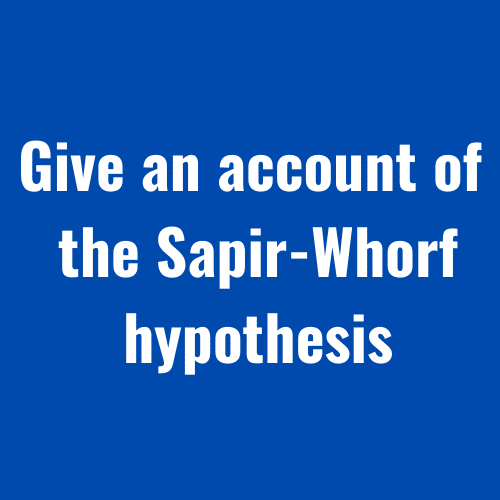Question: Give an account of the Sapir-Whorf hypothesis.
Or, discuss linguistic relativity.
The Sapir-Whorf hypothesis
The Sapir-Whorf hypothesis is a principle that suggests that the structure of a language affects the worldview or cognition or knowledge of its speakers, and thus people’s perceptions are relative to their spoken language.
To put it differently, the Sapir–Whorf hypothesis stands for the proposition that the particular language one says influences the way one thinks about reality. It is also expressed as the linguistic relativity hypothesis which means in close relation to semiotic-level concerns with the general relation of language and at the discourse level about how the use of language in a cultural context can affect thinking.
Methods of explanation
The Sapir-Whorf hypothesis can be described as consisting of two associated principles such as the strong hypothesis and the weak hypothesis.
The strong hypothesis: The strong hypothesis or, linguistic determinism says that language determines thought and that linguistic categories limit and determine cognitive categories. This version is generally accepted as false by modern linguists.
The weak hypothesis: The weak hypothesis or, linguistic relativism says that linguistic categories and uses of language only influence thought and decisions. Research on weak forms has created positive empirical evidence for a relationship.
The reason for the criticism
The term “Sapir–Whorf hypothesis” is thought to be a misnomer by linguists for several reasons: Edward Sapir and Benjamin Lee Whorf never co-authored any works, and never narrated their ideas in terms of a hypothesis. The distinction between a weak and a strong version of this hypothesis is also a later invention; Sapir and Whorf never established such a dichotomy, although often their writings and their views of this relativity principle are entitled in stronger or weaker terms. Depending on the modern research methodology, it is divided into structure-centered, domain-centric, and behavior-centric types.
Range of demand
Although the Sapir-Whorf hypothesis has been criticized and somehow rejected by modern linguists, the principle of linguistic relativity and the relation between language and thought has also received attention in varying academic fields from philosophy to psychology and anthropology, and it has also colored and inspired works of fiction and the invention of constructed languages.
